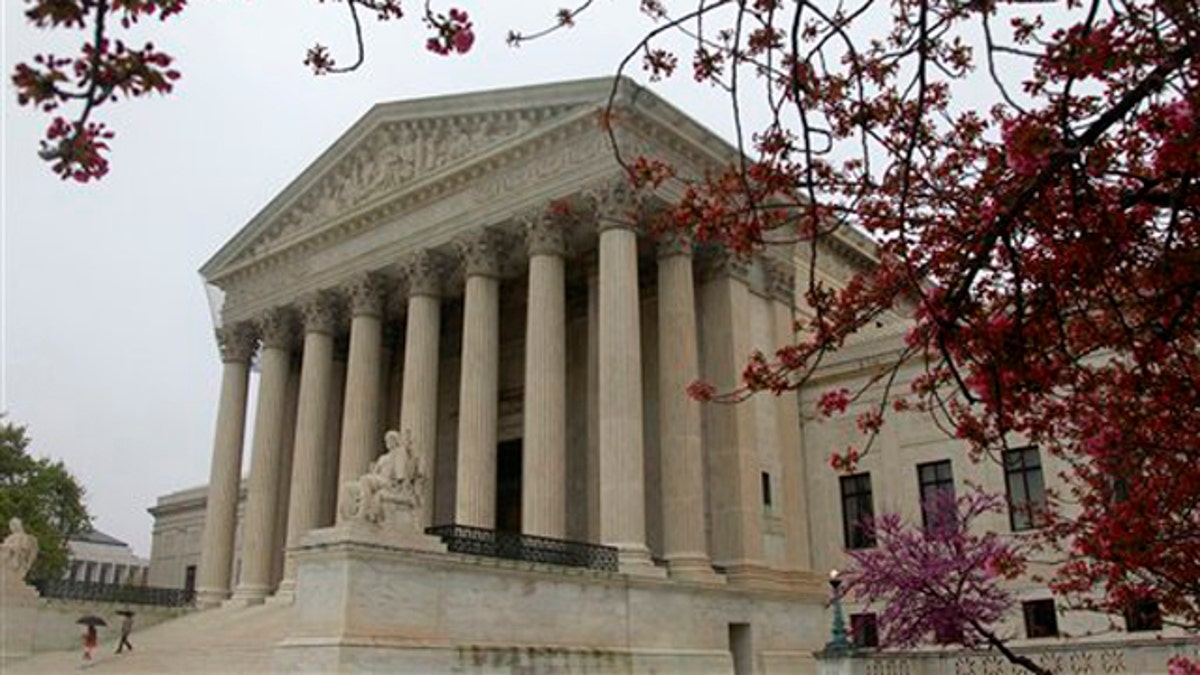
FILE: The United States Supreme Court is seen in Washington, ahead of the landmark hearings on the federal health care overhaul. (AP)
Each October, in ceremonies around the country, the National Federation of Independent Business (NFIB) thanks and honors the legislators who are champions of the small-business community. Deemed “Guardians” by the grateful men and women of Main Street, these policymakers are given a plaque and a statuette of a Minuteman.
The symbol is meaningful if not subtle. Fourth grade history class ensures that the Minuteman is a most recognizable character in our national narrative — an icon for American fortitude, independence and liberty.
The Minuteman reminds us that the most challenging times—times when our freedoms, our values and our livelihoods are under assault—produce extraordinary actions from people. It is during these times of national trial when the citizenry, the ordinary men and women of Main Street America, answer the call to defend those things they hold most dear.
Two years ago, the federal government did something that pushed so far into the cherished realm of personal liberty that Main Street, once again, knew it would have to act.
Big government’s trespass? The law known as “ObamaCare.”
Main Street’s response? Take the government to court and protect individual liberty.
Congress used every political trick in the book to ram through the health care bill in 2010. Peddled as health-insurance reform—a law that would improve accessibility and lower costs—lawmakers lauded their handiwork for its promises of cost-savings, estimated in the billions.
Two years later, federal estimates of the law’s anticipated costs have escalated dramatically. The Congressional Budget Office released a new cost figure last week—$2.6 trillion—after measuring the effects of expanding coverage over the law’s first ten years in effect, and noted that “four million fewer Americans” will have “employer-based coverage” as a result.
For small business owners, who have identified the increasing cost of health insurance as their No. 1 issue for decades, this law has failed on a monumental level.
It offers no incentive for non-offering employers to start providing coverage—87 percent say they are unlikely to start offering after ObamaCare’s passage. And the law’s tax credit for small businesses acts almost exclusively as a windfall for those who currently offer health insurance rather than as an incentive to encourage its purchase.
Only about 2 percent of small employers having fewer than 25 employees are even eligible for a full tax credit and 1.165 million are eligible for the partial credit – less than half of the estimate touted by the White House.
While the economic damage to the business community remains largely unknown until the law takes full effect, the impact on small-business optimism is palpable. Small-business confidence is measurably lower today than it was this time last year, and the law has been identified in study after study as the primary contribution to this erosion of faith in the future.
People are afraid to expand and hire—they are unable to plan for future growth while the fear of new costs shrouds them like a fog on the horizon.
But the biggest cost—the one that carries no dollar figure and affects every American—is the incalculable loss of economic freedom.
Coercing people into making economic decisions that may be financially disadvantageous—in this case purchasing a government approved health insurance plan regardless of personal want or need—forsakes the values that our Founders established as inalienable. It is nothing short of a repudiation of the Constitution.
Our case is considered to be the most significant constitutional challenge since Brown vs. the Board of Education; it will be a critical moment in deciding whether the citizens of the United States are truly free from government control or they are subject to the command and control economy that the government has, thus far, been successful in establishing.
We shudder to think what government-mandated product is next—hybrid cars? Gym memberships? Retirement accounts? If this law stands, new mandates are not a possibility but an inevitability. Perhaps we should make our checks payable to the government now.
We find ourselves in troubled times, but not hopeless times. That is because ordinary citizens have taken action.
This week, the constitutionality of ObamaCare will be debated before the Supreme Court: a challenge made possible by modern-day Minutemen—the men and women of the NFIB. Mounting a legal challenge of this magnitude is viable only because ordinary Americans—mechanics, farmers, accountants, small manufacturers, hair-dressers, gas station owners—saw the threat to liberty and raised their voices in protest.
It has not been an easy road, and NFIB has met with its share of naysayers since joining the lawsuit nearly two years ago. But we have persevered because our members remind us daily what is at stake.
The court will issue a final ruling on the constitutionality of ObamaCare sometime this summer. And when it finds the law has gone too far, as we believe it has, there is something that America should know: The heroism of the ordinary people of America’s Main Streets will have once again stood up, strong, to defend freedom.
There are many reasons to thank America’s small-business owners; this case promises to be one more.
Dan Danner is president and CEO of the National Federation of Independent Business.
